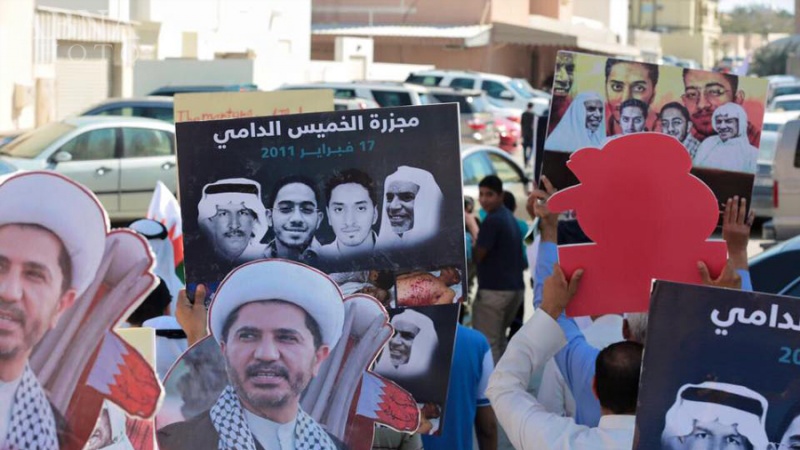Reasons behind prolongation of Bahraini revolution (3)
For a revolution to emerge victorious there is need for a leadership, who would be able to activate the existing discontents in the community to advance the revolution.
The Bahraini uprising is the only Islamic awakening wave revolution which is headed by a single leader, being Sheikh Issa Ahmad Qasem. All of the Bahraini opposition groups from Al-Wefaq, to February 14 Revolution Youth Coalition approve his leadership. Sheikh Issa Ahmad Qasem intends to avoid any attribution to a particular party or current, setting the stage for the gather of all groups and currents so that the revolutionary current would attain its ultimate goal.
Upon the establishment of Bahrain’s Ulema Coalition, which has gathered the major Ulema of Bahrain under a single umbrella, he has also highly contributed to narrowing the gap between the views and thoughts of Bahraini Ulema; each of which lead a part of Bahrain’s community.
Nonetheless, the leadership of Sheikh Issa Ahmad Qasem in Bahrain faces a number of hurdles. Some of the opponents are affiliated to Bahraini government, and with the guidance of Aale Khalifa regime try to obstruct Sheikh Issa Ahmad Qasem’s efforts to narrow the gap between the stands adopted by opposition groups. This is especially the case, given that the Bahraini community is not uniformed; and Bahraini Shias comply with a number of Sources of Emulation, who reside in Qom, Najaf, and a number of other cities.
Meanwhile, although Sheikh Issa Ahmad Qasem is a prominent cleric, he is not a Source of Emulation, which has partly undermined his influence over the Bahraini community. The people of Bahrain highly respect him, but he doesn’t hold the status of a Source of Emulation like the Sources of Emulation in Iran and Iraq. Thus, the compliance of the revolutionaries with his leadership is not in the form of a religious and legitimate duty. Under these conditions, the support of Sources of Emulation for Sheikh Issa Qasem is of paramount importance in advancement of the revolution in Bahrain.
Restrictions; including the advanced age of Sheikh Issa Ahmad Qasem, is also somehow considered as a drawback in his leadership. The Bahraini regime has also attributed him to Iran in a bid to somehow undermine his leadership and Bahraini Shias. Therefore, the status quo in Bahrain cannot be considered to be fully related to the type of leadership of the Bahraini uprising, and in fact outer factors play highlighted roles in the formation of the current conditions in that country.
The Bahraini government is a fragile state, which is weakly supported by social groups. Upon the continuation of the popular uprising in Bahrain, the rift between the Bahraini community and government can no longer be contained. Thus, if the Bahraini revolution is managed by domestic players, a government change would be inevitable. However, the prolongation of the Bahraini uprising and absence of any fundamental change in the status quo in Bahrain goes to show the role played by foreign elements, and regional and international players in Bahrain. Hence, the result of rivalry among outer players will determine the outcome of this uprising. A number of regional and trans-regional players are involved in this scene. Islamic Republic of Iran, the Saudi regime, and the US are some of the players that influence the Bahraini revolution.
Regional competitions between Iran and the Saudi regime have existed. However, tensions emerge whenever a development or crisis emerges in the realms, which both countries are sensitive towards. Bahraini regime has long maintained wide-scale political, economic, and military relations with the Saudi regime and is somehow supported by Riyadh. The Bahraini crisis has taken place amid the emergence of new conditions in Middle East, which in the view of Saudi officials could lead to changes in the environs of Saudi Arabia. In the view of Saudi regime, any empowerment of Shias in Bahrain would bolster Iran’s influence and would threaten the Saudi regime. Hence, the Saudi officials have always urged the suppression of popular protests in Bahrain. The Saudis, upon usage of the military leverage, and upon military presence in Bahrain have ostensibly changed the scene to their favor.
Meanwhile, Iran’s Bahrain Policy is rooted in a series of countless influential elements, such as religious teachings, historical outlook, and the traditional idealism of Iranians toward allies and enemies, mindsets, and surrounding environment. Meanwhile, the interconnectivity of these factors has made it a highly difficult task to weigh each one of these factors.
Moreover, throughout the course of history, Iran has ruled Bahrain and maintains religious commonalties with the overwhelming Shia people of Bahrain. Given these facts, and despite the restrictions that impede Iran’s active presence in developments in Bahrain; Tehran, amid the crisis in Bahrain, has always made use of mostly soft means and approaches to support opposition groups and to halt the suppressive policies of the Bahraini regime, and the meddlesome Saudi and United Arab Emirates forces.
Under these conditions, Iran has made use of political and diplomatic measures such as presentation of a letter to UN chief and consultation with international assemblies such as the Organization for Islamic Cooperation in order to fulfill its considered policy in support for Bahraini revolutionaries.
Among trans-regional powers, the US is the main influential player over developments in Bahrain.
The US, due to deployment of its Fifth Naval Fleet in Bahrain; the importance of the stability of the Persian Gulf Cooperation Council member states for Washington; and concern over the rising influence of Islamic Republic of Iran in the Persian Gulf region, supports the Bahraini regime.
However, Washington doesn’t apply the unilateral approach of Riyadh, which is the wide-scale suppression of any change or reform; and believes that a more moderate approach is needed for restoration of calm in Bahrain and containment of the crisis. Ultimately, the US also calls for continuation of the existing power structure and is against any democratic development in Bahrain which would lead to superiority of opposition Shia groups. In fact, the US doesn’t pursue any alternative policy in this regard.
The US supports the Bahraini government to an extent that would not harm the balance between the Bahraini government and opposition groups, and is after avenues for changing the dialog in the popular uprising of Bahrain from Islamic awakening to liberal democracy. Hence, it intends to establish interactions with the revolutionary leaders.
The European Union is another trans-regional player, who mostly toes the US line towards the developments in Bahrain. In fact, European states believe that their strategic interests in the Persian Gulf region are fulfilled as the result of continuation of their solid relations with the Persian Gulf Cooperation Council Arab member states.
Meanwhile, the role of international organizations in developments in Bahrain has been highly neutral and even negative. For instance, the UN Security Council has remained silent in regards to developments in Bahrain and has not even assigned a meeting to study the crisis in Bahrain and the suppression of Bahraini protesters by the Saudi-backed Bahraini regime’s troopers.
The Bahraini revolution maintains the initial parameters needed for formation of a nationwide revolution, such as the discontent of majority of Bahraini people; all-encompassing participation of people of Bahrain in protests; continuation of protests; and a wise leader such as Sheikh Issa Ahmad Qasem, and Sheikh Ali Salman, the imprisoned secretary general of Al-Wefaq Group. However, a number of structural and executive challenges have prolonged the revolution in that country.
Given the roles played by domestic, regional, and international variables in Bahrain, any development in this country is practically tied to the action and reaction of domestic, regional, and international players, influencing these developments.
In addition to the influential role of revolutionary parties and currents of Bahrain and the Bahraini regime, Iran’s approach toward the Persian Gulf Cooperation Council and the Arab League in the regional level; and the approaches of the US, European Union, Russia, China, and international organizations can influence the future of developments in Bahrain.



